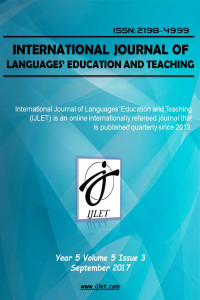Language Learning Attitudes: Ingrained Or Shaped In Time?
Öz
Anahtar Kelimeler
Kaynakça
- Alqahtani, M. (2015). The importance of vocabulary in language learning and how to be taught. International Journal of Teaching and Education, 3(3), 21-34. DOI: 10.20472/TE.2015.3.3.002
- Aydoslu, U. (2005). Öğretmen Adaylarinin Yabanci Dil Olarak İngilizce Dersine İlişkin Tutumlarinin İncelenmesi (B.E.F. Örneği) [A Comparative Analysis of Student Teachers’ Attitudes towards English Course as a Foreign Language (The Case Study of B.E.F.)]. MA Thesis, Süleyman Demirel University, Isparta
- Blake, D., & Smith, P. (2007). Examining the significance of different conceptions of learning. In Proceedings of the AARE International Education Research Conference, 1-12
- Burnett, P.C., Pillay, H. & Dart, B.C. (2003). The influences of conceptions of learning and learner self-concept on high school students’ approaches to learning. Social Psychology International, 24(1), 54-66
- Davis, A. (2003). Teachers’ and students’ beliefs regarding aspects of language learning. Evaluation & Research in Education, 17(4), 207-222
- Engh, D. (2013). Why Use Music in English Language Learning? A Survey of the Literature. English Language Teaching, 6(2), 113-127. doi:10.5539/elt.v6n2p113
- Hosseini, S.B. & Pourmandnia, D. (2013). Language learners’ attitudes and beliefs: brief review of the related literature and frameworks. International Journal on New Trends in Education and Their Implications, 4(4), 63-74
- Jarvis, P. (2006). Towards a comprehensive theory of human learning. New York: Routledge, Taylor & Francis Group
- Juriševič, M. & Pižorn, K. (2013). Young foreign language learners’ motivation – A Slovenian experience. Porta Linguarum, 19, 179-198
Language Learning Attitudes: Ingrained Or Shaped In Time?
Öz
Language learning constitutes an essential need in today’s world. From academic to social settings, humans need to communicate in a different language to survive in their target community. However, despite this increasing importance of language, it is difficult to say we have learned a foreign language successfully on a large scale since there are a lot of factors in language learning process. Language attitudes, one of these factors, influence this process both positively and negatively, depending on how we view learning a foreign language. Therefore, this study deals with the issue of language attitudes to uncover learners’ language conceptions and probable effects on their learning. Moreover, this study aims to reveal the potential positive or negative role of past learning experiences on the development of language beliefs. Thus, 35 university students in their 1st, 2nd, 3rd and 4th years constitute the participants of the study. Based on mixed research design, the study is comprised of both quantitative and qualitative data. Quantitative data were gathered through Attitude Scale towards English Course, and the analyses were performed with Statistical Packages for Social Sciences (SPSS 17.0 version for Windows). The qualitative data were collected from students’ reports of their own autobiographies regarding their previous language learning experiences in elementary, secondary, high school and university years, and were subjected to the content analysis. The study showed language attitudes from behavioural, cognitive and affective perspectives and found out different factors in shaping students’ learning conceptions.
Anahtar Kelimeler
Kaynakça
- Alqahtani, M. (2015). The importance of vocabulary in language learning and how to be taught. International Journal of Teaching and Education, 3(3), 21-34. DOI: 10.20472/TE.2015.3.3.002
- Aydoslu, U. (2005). Öğretmen Adaylarinin Yabanci Dil Olarak İngilizce Dersine İlişkin Tutumlarinin İncelenmesi (B.E.F. Örneği) [A Comparative Analysis of Student Teachers’ Attitudes towards English Course as a Foreign Language (The Case Study of B.E.F.)]. MA Thesis, Süleyman Demirel University, Isparta
- Blake, D., & Smith, P. (2007). Examining the significance of different conceptions of learning. In Proceedings of the AARE International Education Research Conference, 1-12
- Burnett, P.C., Pillay, H. & Dart, B.C. (2003). The influences of conceptions of learning and learner self-concept on high school students’ approaches to learning. Social Psychology International, 24(1), 54-66
- Davis, A. (2003). Teachers’ and students’ beliefs regarding aspects of language learning. Evaluation & Research in Education, 17(4), 207-222
- Engh, D. (2013). Why Use Music in English Language Learning? A Survey of the Literature. English Language Teaching, 6(2), 113-127. doi:10.5539/elt.v6n2p113
- Hosseini, S.B. & Pourmandnia, D. (2013). Language learners’ attitudes and beliefs: brief review of the related literature and frameworks. International Journal on New Trends in Education and Their Implications, 4(4), 63-74
- Jarvis, P. (2006). Towards a comprehensive theory of human learning. New York: Routledge, Taylor & Francis Group
- Juriševič, M. & Pižorn, K. (2013). Young foreign language learners’ motivation – A Slovenian experience. Porta Linguarum, 19, 179-198
Ayrıntılar
| Birincil Dil | İngilizce |
|---|---|
| Konular | İkinci Bir Dil Olarak İngilizce |
| Bölüm | Araştırma Makalesi |
| Yazarlar | |
| Yayımlanma Tarihi | 30 Eylül 2017 |
| Yayımlandığı Sayı | Yıl 2017 Cilt: 5 Sayı: 3 |

